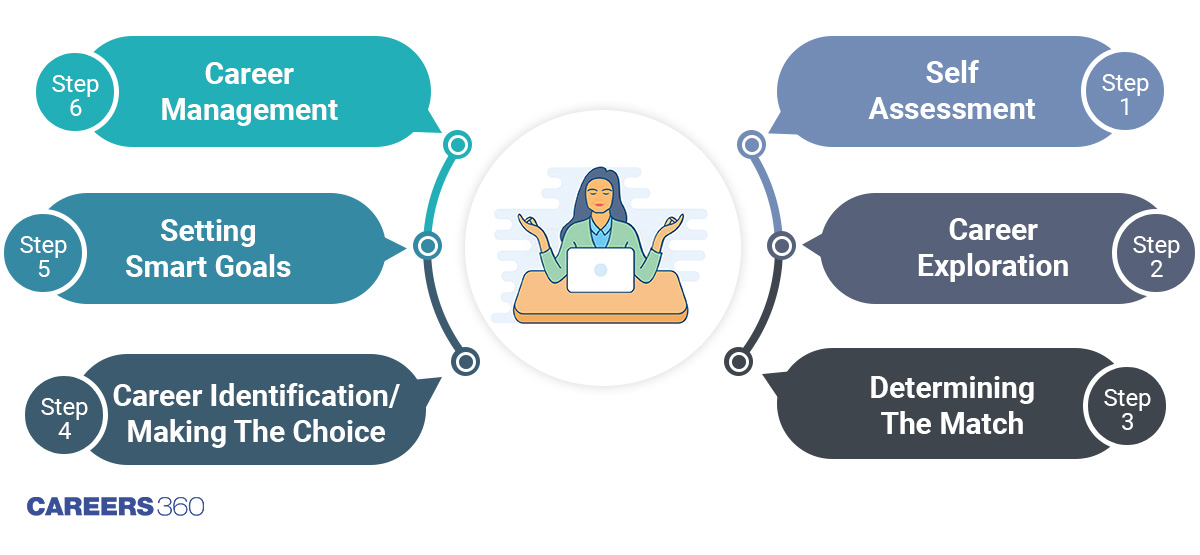Career Planning Process
Choosing the right career is an important step that determines the direction of your professional life. It is believed that an individual would spend approx 40 to 45 years of their life at work. So, since we spend a major time span of our lives working, we definitely do not want to get into a career that does not satisfy us.

Career planning process is ongoing, and involves planning and taking steps that help you achieve your career goal. Many times you may need to reiterate these steps, to stay on track in your career. Career planning stresses the importance of knowing yourself – your unique attributes, abilities, and career opportunities and helps you better manage your aspirations and goals. The career that you enter will influence your entire lifestyle, self-concept, income, and location. As it is a crucial aspect of your life, it is essential to plan it correctly.
Stay on this page to understand in detail the career planning process, steps in career planning, and much more.
Also read:
Also read-
Career Planning Process - Steps In Career Planning
Let us now understand the steps in career planning in depth, one by one.
 Steps In The Career Planning Process
Steps In The Career Planning Process
Career Planning Process: Step 1 - Self-Assessment
This is the first of the steps in career planning. It’s important to enhance self-understanding. Create a self-evaluation sheet that includes the following questions:
What do I enjoy doing?
What motivates me?
What are my professional goals?
What qualifications and experience do I have?
What are my strengths?
What are my weaknesses?
What is my desired salary?
Career assessment tools or consulting a trained career counsellor can also help you figure out what kind of job or work environment will best suit you. This might be the most difficult step in the process of career planning, but it forms the foundation for all the next steps.
Also read- Top 5 Factors For Career Options In India
Career Planning Process: Step 2 – Career Exploration
This is the second of the steps in career planning. After self-analysis and discovering your strengths and interests, it is important to conduct thorough research about different career options and growth opportunities available. It becomes essential to identify career options and understand the world of work. Talk to people in the industry, and get an idea about the qualifications, experience, and skill requirements or any additional degree or experience that is required to get that desired job.
You can gather career information by:
Reading about all the available careers – Books, magazines, newspapers, journals, and the internet are excellent sources of gathering information about all the available careers.
Talking to people in the industry – People working in the industry give you the most up-to-date detailed description of the job responsibilities and insights about the working environment.
Internships or volunteering in the field – Interning or volunteering in a field that seems even slightly interesting will give you a first-hand experience of what the work entails, and whether your interest, personality and skills are a right fit for the occupation.
Exploring different career options most definitely fuels your process of career planning.
Also read- Which Is The Best Career Option To Choose In Today's Times?
Career Planning Process: Step 3 – Determining The Match
After gathering information about yourself and researching several career alternatives, the next step is to identify and bridge the gaps between the desired job roles and what you have and need to achieve your primary career goal. This is the third step in career planning. According to research, people who write their goals are more inclined to achieve them. Writing down your goals helps you to achieve them with dedication and promptly. You can consider these questions for understanding your career options:
What is the scope of the chosen career?
What is the room for improvement and expansion in that career path?
Also read- How To Make A Career Choice When You Are Undecided
Career Planning Process: Step 4- Career Identification/Making The Choice
Choose a career that fits in well with your interests, goals, and abilities.
This is the next of step in career planning. It’s always advisable to have at least two- three career options in hand rather than just one. Set short-term and long-term career objectives to have a clear career path. The process of career planning puts you in the driver’s seat in your career journey, and lets you make confident choices for your future endeavours. You can also consider the following factors:-
What are the specific educational requirements and the study route for the chosen career?
How to obtain those educational qualifications?
What internships, special courses or training is required to excel in that job?
What are the new skills and knowledge required that is in line with the industry requirements?
Also read- 5 Steps To Finding The Right Career For You
Career Planning Process: Step 5- Taking Action- Setting SMART Goals
After finalizing the best available career options from the range of alternatives, prepare an action plan to achieve the set career goal. It’s important to set realistic goals and set proper timelines. This can be understood as the fifth step in career planning. Setting SMART goals helps you determine a clear path to follow and lets you focus in the right direction.
Specific -- Be clear and specific in identifying your goals.
Measurable – Set realistic goals to determine progress and accomplishment.
Attainable – Plan short-term goals and long-term attainable goals that have a greater chance of success.
Relevant – How relevant or important the career is to you?
Time-bound -- Commit to specific timeframe deadlines
Also read- How To Choose A Stream In Class 11
Steps In Career Planning: Step 6 - Career Management
Once you obtain the desired career position that utilizes your skills, and interests and satisfies your values, it’s important to manage the career effectively and efficiently.
The understanding of the world of work, networks and contributions that you make on the job, directly affects your job security and advancement opportunities.
The process of career planning is a way to manage your career goals and aspirations and structure your career path. The career planning process does not really have any definite end and helps you to achieve short-term or long-term goals at any career stage of your life. Taking the time to plan your career will help to keep you focused on the goal. It is important to set short-term goals and keep reviewing your career plans monthly, which will help you to update and fill the gaps needed.
Students also liked
- Online Certification Courses
- Top Certification Course Providers
- Online Degree and Diploma Courses
- Online Free Courses and Certifications
- Online Short-Term Courses and Certifications
- View the List of all Online Courses and Certifications
The study route you take, your choice of majors and specialisation, your work experience, and the people you meet will influence the career decisions you make in your lifetime. And to build a successful career and reap the benefits that come from it, you need to spend some time planning it properly.
Also read-
Yashodhra Arora is a counselling psychologist. She holds more than 10 years of hands-on experience in HR, and behavioural and career counselling of high school students, in India and the USA.
Frequently Asked Questions (FAQs)
Career planning outlines a roadmap to your future. It also helps you to bridge the gaps between who you are and where you would want to be. Most importantly, it guides you when you are considering a job or industry change by helping you figure out that the choice fits your ultimate career goal.
Career planning can be divided into four stages :
Assessment Stage – In this stage, you gather information about yourself and assess your interests and abilities.
Investigation Stage –In this stage, you do thorough research about all the available career options
Preparation Stage – In this stage, you match your understanding with the career options.
Commitment Stage – In this stage, you create an action plan to achieve the desired choice of occupation
Evaluate your career options and match your interests, abilities and personality with them. Once you have matched, narrow your choices to at least 2-3 career options and create an action plan to achieve them.
You can determine your interests by asking some of the following questions:
What do I like to do?
In what subjects do I score well?
Do I have creative or mathematical abilities?
What motivates me?
Swot analysis refers to the Strengths, Weaknesses, Opportunities and Threats model that elaborates and categorizes your strong points in personality and lists out areas where a little improvement is required.
Applications for Admissions are open.
As per latest syllabus. Physics formulas, equations, & laws of class 11 & 12th chapters
JEE Main Important Chemistry formulas
Get nowAs per latest syllabus. Chemistry formulas, equations, & laws of class 11 & 12th chapters
JEE Main high scoring chapters and topics
Get nowAs per latest 2024 syllabus. Study 40% syllabus and score upto 100% marks in JEE
JEE Main Important Mathematics Formulas
Get nowAs per latest syllabus. Maths formulas, equations, & theorems of class 11 & 12th chapters
